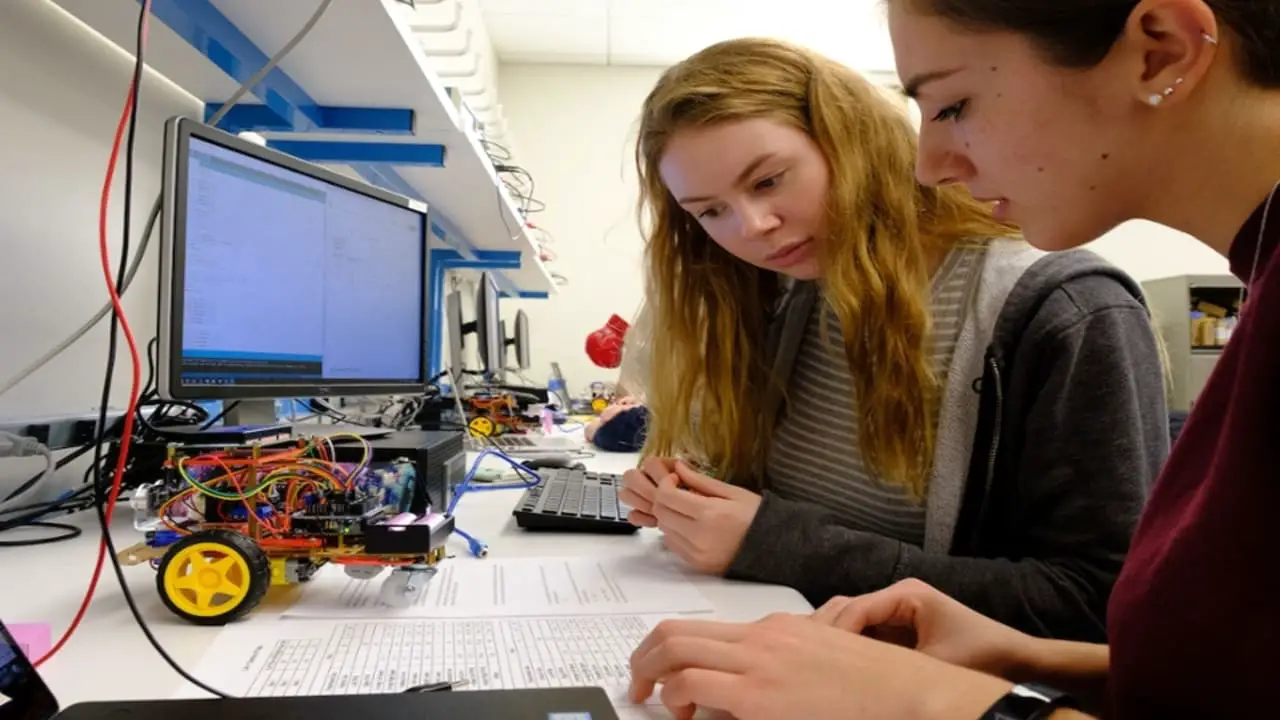The field of robotics engineering is experiencing unprecedented growth, revolutionizing industries and pushing the boundaries of technological innovation. Robots have become integral to various domains, from manufacturing and healthcare to space exploration and entertainment.
This surge in robotics has created a high demand for skilled robotics engineers, making it crucial to choose the right college for a successful career in this field. Choosing the right college is essential in shaping your educational experience and providing you with the necessary skills and knowledge to thrive in robotics engineering.
The best colleges for robotics engineering offer comprehensive programs that blend theoretical foundations with practical training. These institutions expose students to cutting-edge research and technology, preparing them to tackle the challenges of the future.
In this article, we explore the top colleges for studying robotics engineering. We will consider factors such as accreditation, curriculum, faculty expertise, industry connections, and available resources. By examining these institutions in detail, prospective students can make informed decisions and choose a college that aligns with their goals and aspirations.
Whether you are a high school student exploring your academic options or a working professional looking to enhance your skills, this comprehensive guide will help you navigate the landscape of robotics engineering education and discover the colleges that will shape the future robotics engineers of tomorrow.
Factors to Consider When Choosing a College for Robotics Engineering
When embarking on the journey to become to robotics engineer, choosing the right college is a crucial step. Several key factors should be taken into consideration to ensure that the chosen institution provides the necessary foundation and opportunities for a successful career in robotics engineering.
- Accreditation and reputation of the college: Choose a college with proper accreditation in robotics engineering and a strong reputation within the robotics community. This ensures that the institution meets educational standards and is recognized by employers.
- Curriculum and courses offered in robotics engineering: Look for a comprehensive and interdisciplinary curriculum that covers core subjects like mechanical engineering, electrical engineering, computer science, and specialized robotics courses. A well-rounded curriculum equips you with the knowledge and skills needed in this evolving field.
- Faculty expertise and research opportunities: Seek colleges with faculty members who specialize in robotics and have active research involvement. This provides valuable insights and networking opportunities, fostering a dynamic learning environment.
- Industry connections and internships: Opt for a college with strong industry connections and partnerships. This opens doors to internships, cooperative education programs, and potential job placements, offering valuable real-world experience.
- Facilities and resources: Check for well-equipped robotics labs, access to advanced technologies, and resources such as maker spaces and robotics clubs. These facilities enhance hands-on learning and provide opportunities for experimentation and innovation.
Top Colleges for Robotics Engineering

1. Massachusetts Institute of Technology (MIT)
Located in Cambridge, Massachusetts, MIT benefits from its proximity to the vibrant robotics ecosystem of Boston, including tech companies, startups, and research institutions. MIT has a rich history in robotics, being one of the pioneers in the field.
Its robotics research dates back to the early 1970s, and it has consistently been at the forefront of robotics advancements. MIT fosters a culture of innovation and collaboration, encouraging students to explore interdisciplinary research and hands-on projects.
The campus is known for its vibrant intellectual atmosphere and entrepreneurial spirit. MIT boasts renowned faculty members in robotics, including Cynthia Breazeal, known for her work on social robots, and Daniela Rus, an expert in autonomous systems.
MIT’s Robotics program offers state-of-the-art facilities and research opportunities in areas like computer vision, artificial intelligence, and autonomous systems. Students can also participate in robotics competitions like the annual DARPA Robotics Challenge.
2. Stanford University
Situated in the heart of Silicon Valley, Stanford University benefits from its proximity to leading tech companies, venture capital firms, and research institutions, providing abundant opportunities for collaboration and internships. Stanford has a long-standing history of excellence in robotics.
The university’s robotics program has been influential in shaping the field since its establishment in the early 1980s. Stanford fosters a culture of innovation, interdisciplinary collaboration, and entrepreneurship. The university encourages students to think creatively, take risks, and develop practical solutions to real-world problems.
Stanford’s robotics faculty includes esteemed individuals such as Oussama Khatib, a leading authority on robot manipulation, and Fei-Fei Li, known for her work in computer vision and AI ethics.
Stanford offers cutting-edge research facilities and centers of excellence, such as the Stanford Artificial Intelligence Laboratory (SAIL) and the Stanford Robotics Laboratory. The university also hosts the Stanford AI Lab Outreach Summer (SAILORS) program, which aims to promote diversity in AI and robotics.
3. Carnegie Mellon University (CMU)
Located in Pittsburgh, Pennsylvania, CMU benefits from its proximity to a burgeoning tech scene and access to cutting-edge research facilities. The city’s affordability and quality of life make it an attractive location for robotics students. CMU has a long and prestigious history in robotics, dating back to the early 1980s when it established the Robotics Institute.
It has played a significant role in advancing robotics technology and education. CMU has a collaborative and interdisciplinary culture, encouraging students to explore various fields and collaborate across departments. The university promotes a hands-on approach to learning, emphasizing practical applications of robotics technology.
CMU boasts a world-class faculty, including pioneers in robotics like Red Whittaker, known for his work in field robotics, and Manuela Veloso, a leader in the field of autonomous agents and multi-robot systems.
CMU’s Robotics Institute offers a diverse range of robotics programs, including areas such as autonomous systems, computer vision, and human-robot interaction. CMU is known for its strong emphasis on research and provides ample opportunities for students to engage in cutting-edge projects.
4. University of Pennsylvania (UPenn)
Located in Philadelphia, the University of Pennsylvania benefits from its proximity to a thriving robotics ecosystem. The city provides opportunities for collaborations with industry leaders, startups, and research institutions, fostering a dynamic environment for robotics enthusiasts.
UPenn has a strong tradition of excellence in robotics, with its robotics program established in the late 1960s. It has been at the forefront of robotics research and education, contributing significantly to the field. UPenn promotes an interdisciplinary approach to learning, encouraging students to explore connections between robotics and fields like computer science, engineering, and healthcare.
The campus culture emphasizes innovation, creativity, and social impact. UPenn’s faculty includes distinguished robotics experts such as Vijay Kumar, known for his work in autonomous aerial robotics, and Katherine J. Kuchenbecker, renowned for her research in haptic feedback and robotic surgery.
UPenn offers state-of-the-art research facilities, including the GRASP Lab (General Robotics, Automation, Sensing, and Perception), where students have the opportunity to work on groundbreaking projects in areas like swarm robotics, soft robotics, and human-robot interaction.
5. Georgia Institute of Technology (Georgia Tech)
Georgia Tech has established itself as a leading institution in robotics engineering since the late 1970s. Its commitment to robotics education and research has contributed significantly to advancements in the field. Situated in Atlanta, Georgia, Georgia Tech benefits from its proximity to a diverse range of industries, including aerospace, manufacturing, and healthcare.
The city offers numerous networking and internship opportunities for robotics students. Georgia Tech fosters a collaborative and entrepreneurial spirit among its students. The campus culture emphasizes hands-on learning, teamwork, and innovation, creating an environment that nurtures creativity and problem-solving skills.
Georgia Tech’s robotics faculty includes esteemed researchers such as Charlie Kemp, known for his work in assistive robotics, and Sonia Chernova, a leader in social and educational robotics.
Georgia Tech’s Institute for Robotics and Intelligent Machines (IRIM) provides cutting-edge research facilities and opportunities for interdisciplinary collaboration. The college offers specialized tracks in areas like robot perception, control, and cognition, allowing students to focus their studies on their specific interests.
Factors Beyond College Rankings
Robotics engineering offers a promising career path with a wide range of job opportunities across various industries. Understanding the job prospects and potential career paths can further inform your decision when choosing a college for robotics engineering.
- Industry Demand: The demand for robotics engineers is rapidly growing as industries increasingly integrate automation and robotics technologies into their operations. Industries such as manufacturing, healthcare, aerospace, agriculture, and logistics heavily rely on robotics solutions to improve efficiency, productivity, and safety.
- Research and Development: Many robotics engineers find rewarding careers in research and development (R&D). They work on designing and improving robots, developing innovative algorithms, and pushing the boundaries of robotics technology. R&D roles can be found in academic institutions, government research organizations, and private research and development labs.
- Industrial Robotics: With the increasing automation of manufacturing processes, robotics engineers play a crucial role in developing and maintaining industrial robots. They work on robot programming, integration, and optimization to enhance productivity and efficiency in manufacturing settings.
- Autonomous Systems: The field of autonomous systems is rapidly advancing, and robotics engineers are at the forefront of developing self-driving cars, drones, and unmanned aerial vehicles (UAVs). Careers in autonomous systems involve developing algorithms for navigation, perception, and decision-making, as well as ensuring the safety and reliability of autonomous systems.
- Healthcare Robotics: Robotics engineers are also making significant contributions to the healthcare industry. They work on developing robotic surgical systems, rehabilitation robots, assistive technologies for the elderly and disabled, and medical imaging robotics. These roles combine engineering expertise with an understanding of healthcare needs and patient safety.
- Entrepreneurship and Startups: Robotics engineering graduates often have the entrepreneurial spirit to start their own robotics companies or join early-stage startups. This path allows them to innovate and develop cutting-edge robotics solutions, create new products, and contribute to the growth and disruption of various industries.
- Continuing Education and Research: For those interested in academia and research, pursuing advanced degrees such as a Master’s or Ph.D. in robotics engineering can open doors to teaching positions, research fellowships, and leading research teams in academia or industry.
Conclusion
In conclusion, exploring the top colleges for robotics engineering is a crucial step in your educational journey toward a rewarding career in this rapidly advancing field. While college rankings provide a starting point, it is essential to consider factors beyond rankings, such as specialization, industry partnerships, alumni networks, research facilities, collaboration opportunities, and international experiences.
Remember to also consider the job prospects and potential career paths in robotics engineering to ensure your chosen college prepares you for success in this dynamic and innovative field. With thorough research and careful consideration, you can find the college that will provide you with the necessary skills, knowledge, and opportunities to thrive as a robotics engineer.
Additional Posts:


